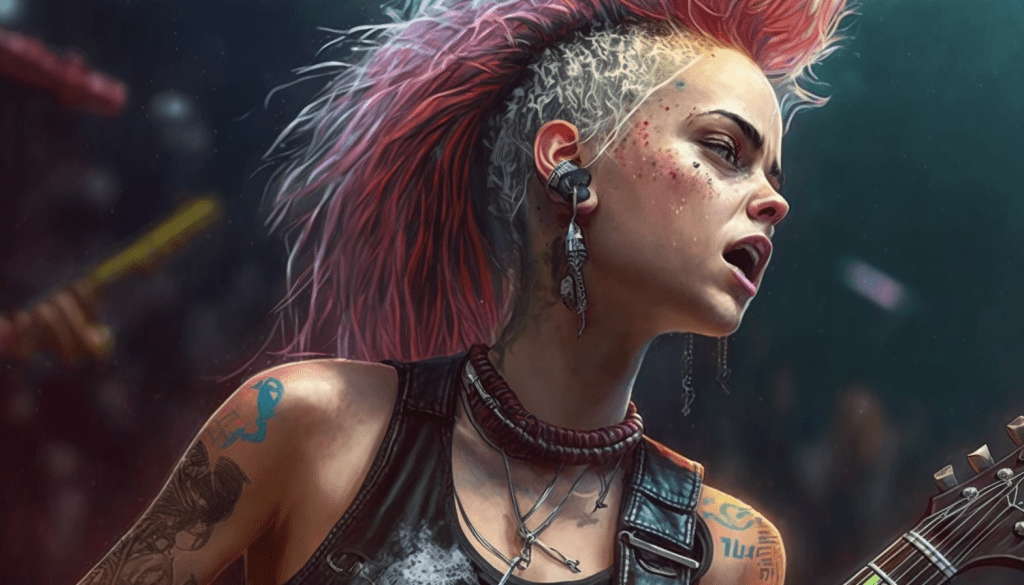Punk rock took the music world by storm 50 years ago. And as the saying goes, punk’s not dead.
You or someone you know might’ve described an angsty teen as being a punk. But that’s quite different from the actual meaning of the genre punk rock.
Join us as we step out of the mainstream and look into the world of punk.
Let’s hit it!
What Is Punk Rock?
If the lead singer has a mohawk and ripped jeans, you might be at a punk show. Historically, punk rockers reject mainstream pop and rock music. They usually come from working-class backgrounds and have a do-it-yourself (or DIY) attitude in the music world. Though their bands contain fewer people than a traditional rock and roll band, the sound they produce isn’t any quieter.

This genre has been known for its loud and fast songs since its inception in the 1970s. As an aggressive subgenre of rock and roll, punk rock usually has simple song structures and doesn’t often feature musical virtuosity. Additionally, punk songs tend to have anti-establishment themes, contributing to the bands’ buck-the-system point of view.
Where Did the Name Punk Rock Come From?
The word punk has been around a lot longer than the genre of music. In fact, it originated in the 1500s as a slang word for a prostitute. Later it became jargon for vagabonds or troublemakers.
The Merriam-Webster dictionary defines punk as “extreme and often deliberately offensive expressions…of social discontent.” In essence, this describes the entire vibe of the punk scene in music. Rockers of this genre tried to disrupt the system, even if it meant upsetting or offending people. The five-hundred-year-old word perfectly captured the objectives of this type of rock and roll.
What Is the History Behind Punk Rock?
Punk scenes developed simultaneously in London and New York in the early 1970s. Rockers began breaking the rules of music because they didn’t even know, or care about, the rules. These musicians, often with limited experience and skill, began playing raw shows with their bands.
This crude music often became political. In England, during a recession, most young people found themselves out of work. So, with ample free time and a need to express their anger, they made music.
Similarly, punk rock musicians rebelled against the mainstream music industry in the United States with their DIY practices. Bands used old, unwanted equipment to record and press their own records. They made music for art’s sake instead of making it to get rich. This set them free of rules and expectations, allowing punk rockers to create their own unique sound.
What Does Punk Rock Stand For?
Traditionally, punk bands stand against industry standards and norms. They fight against the commodification of music. But, in a world of sheep following the mainstream, they strive to be something different. Punk rockers don’t follow the rules, they make their own.
Punk and politics go hand in hand. The genre, born from civil unrest in the U.K., gave young people a platform to express their discontent. Even today, punk artists partake in political activism fighting for things like feminism and environmentalism.
Famous Punk Rock Bands
The genre of punk rock disrupted the entire music scene. While many bands of this style flew under the radar, a few broke through. Let’s look at a few of the groups with the greatest influence on the punk scene.
Ramones
The Ramones were formed in New York in 1974. The group had a raw, unrefined sound that revolutionized the rock genre. In the early days of their career, their shows barely lasted twenty minutes, and all the songs ran under two minutes. In fact, short tunes and sets went on to be a cornerstone of the punk style.
This band sang songs about their teenage life and made fun of pop culture. You’ve probably heard their song Blitzkrieg Bop. It begins with the lyrics, “hey ho, let’s go!” It describes the punk notion that kids who fall in line go on to lose their minds. Other popular Ramones songs include I Wanna Be Sedated and Pet Semetary.
Sex Pistols
Just across the pond from the Ramones, the Sex Pistols got their start in London in 1975. This group kickstarted the punk movement in the U.K.
Their frontman, John Lyndon, wasn’t a great singer, but musical talent was never a key element in punk. Instead, the group communicated their nonconformist ideas with their audiences, and that’s what mattered.
The Sex Pistols’ ironic single God Save the Queen calls the monarchy’s legitimacy into question. The lyrics say, “God save the queen, the fascist regime, they made you a moron.” This group fought for anarchy and rejected the light-hearted nature of Ramones’ songs. Though they lasted only a few years, the Sex Pistol’s impact on punk rock can be called monumental.
Black Flag
The hardcore punk band Black Flag formed in Los Angeles in 1976. They toured every area of the U.S. each year. Their constant touring ensured that they influenced punk bands across the nation. Black Flag also started its own record label, aligning with the DIY aesthetic of punk.
This band became known for their loud, metal-like songs, including their biggest hit in 1981, Rise Above. The lyrics say, “society’s arms of control…think they’re smart, can’t think for themselves.” Other tunes you may know from this group include Nervous Breakdown and Depression, both released in the early 1980s.
Punk’s Not Dead
The combination of loud guitars, singers who can’t sing, a DIY attitude, and a willingness to buck the system gives us punk rock. It’s amazing to realize this genre has been around for half a century. Instead of relying heavily on musical talent, punk rockers look to spread a message of non-conformity.
Are you a fan of punk rock? Tell us about your favorite punk band in the comments below!

Was Blondie Really Punk? | Great Oldies
Saturday 25th of November 2023
[…] Do you know? How Did Punk Rock Get Its Name? […]